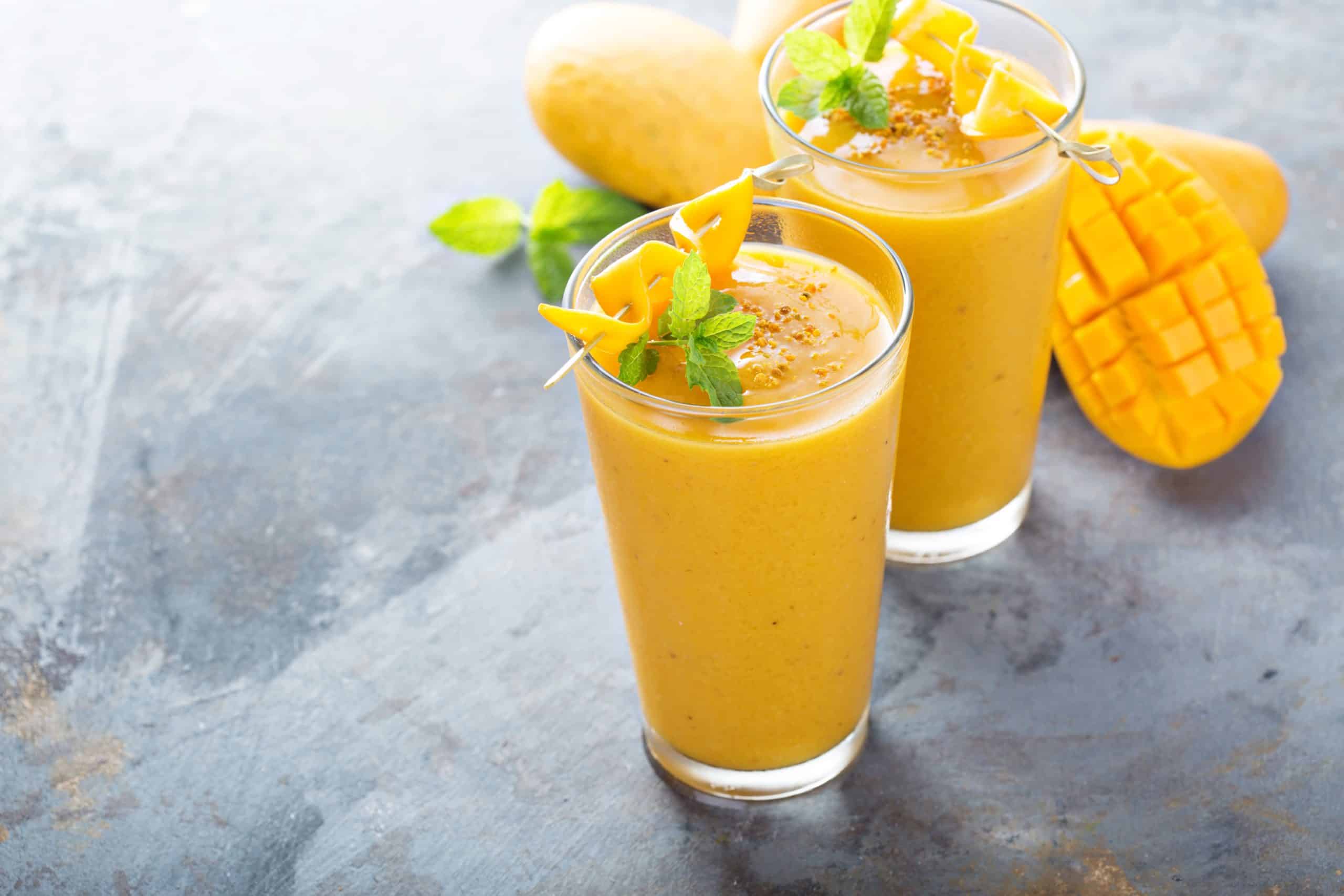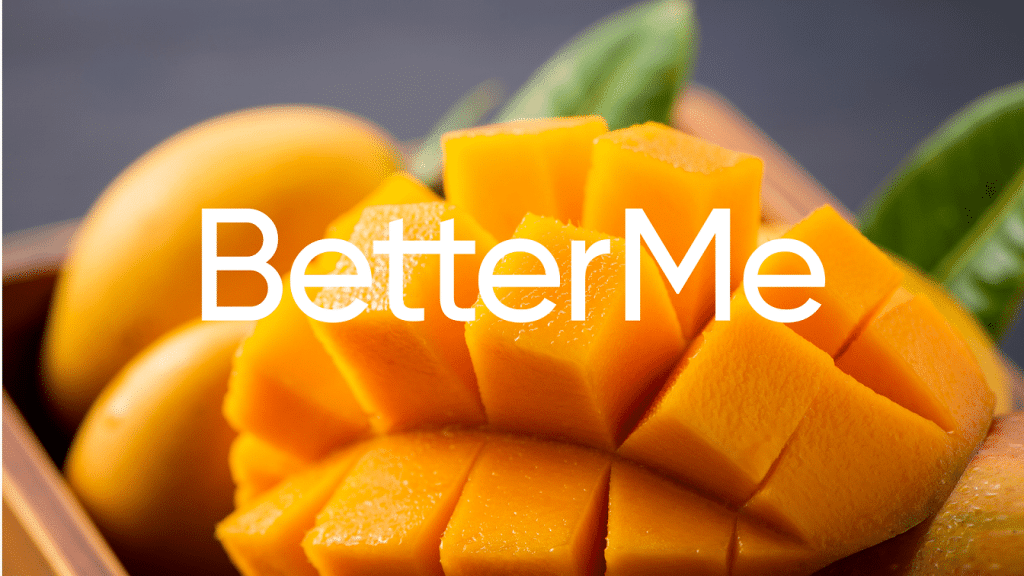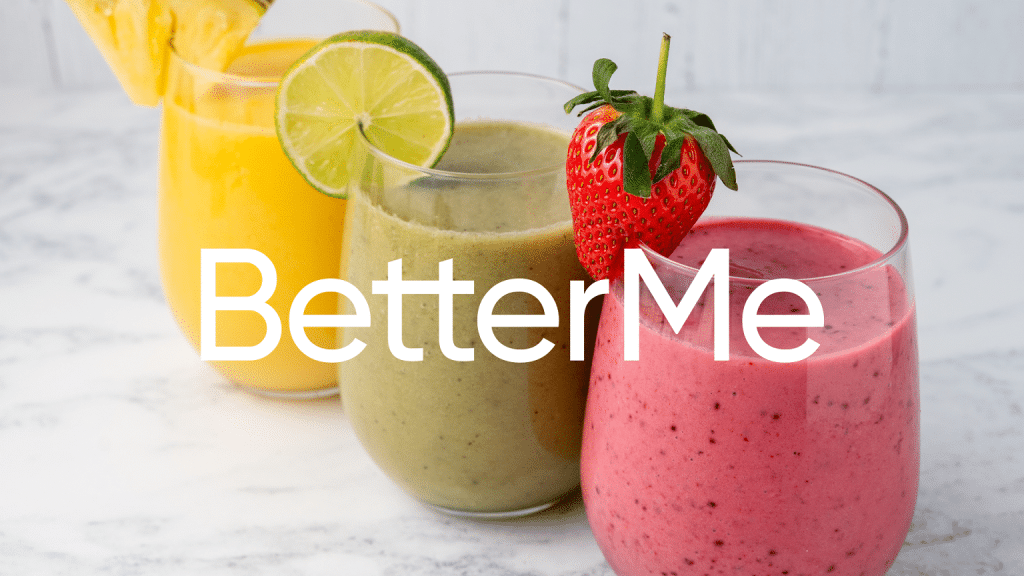High on the list of tropical delights is the humble mango. This botanically diverse fruit is prized for its juicy and sweet taste, bright color, and nutritional powerhouse benefits. It also helps that mangos grow in many tropical and subtropical regions around the world, giving them a relatively long harvest season.
This means that, unlike pricier exotic fruits you can usually find a steady supply of mangos in most grocery stores and even markets.
In this article we’ll talk about juicing. You know, the kind that’s becoming increasingly popular in health-conscious circles.
Juicing mangos offers an array of health benefits, but it’s not without its drawbacks. We will discuss both the pros and cons so you can make an informed decision about juicing mangoes.
What’s In a Mango?
Before we get to the nitty gritty of juicing, let’s take a look at what’s inside a mango. Why should this fruit be so prized for its nutritional value?
According to the United States Department of Agriculture (USDA), one cup of mango contains (17):
- Calories: 99
- Protein: 1.4 grams
- Carbs: 24.7 grams
- Fat: 0.6 grams
- Fiber: 2.6 grams
- Sugar: 22.5 grams
- Vitamin C: 67% of the Daily Value (DV)
- Copper: 20% of the DV
- Folate: 18% of the DV
- Vitamin B6: 12% of the DV
- Vitamin A: 10% of the DV
- Vitamin E: 10% of the DV
- Vitamin K: 6% of the DV
- Niacin: 7% of the DV
- Potassium: 6% of the DV
- Riboflavin: 5% of the DV
- Magnesium: 4% of the DV
- Thiamine: 4% of the DV
The calorie-nutrient ratio in a mango is quite favorable, as you can see. Not only does it provide several essential vitamins and minerals, but the fruit also contains plant compounds such as gallotannins and anthocyanins. These are known for their antioxidant properties and are thought to help protect against certain diseases (1).
Read More: Benefits Of Celery Juice: 6 Reasons Why Drinking This Veggie Elixir Is A Good Idea
Health Benefits of Mango
Not much research has been done on the specific benefits of mangoes, but we can make some educated guesses based on the nutritional content of the fruit. Here are a few potential health benefits you may reap from consuming the tropical fruit:
Low Calorie-Density for Weight Loss
Mangos are low in calories and can provide a substantial amount of fiber. This means that you can eat a large portion without consuming too many calories, which could help with weight loss (8).
The calorie density (calories per gram) of mangoes varies depending on the ripeness of the fruit. Ripe mangos are higher in calories but still low compared to other fruits.
Rich Source of Antioxidants for a Stronger Immune System
Mangos contain a variety of antioxidants, including gallotannins and anthocyanins. These compounds are known for having anti-inflammatory and antiviral effects. The antioxidants may help boost your immune system and protect against certain diseases (2) (21).
Other immune-boosting nutrients in mango include:
- Copper – Copper helps to maintain the structural integrity of cells, which can help keep your immune system strong (6).
- Vitamin C – Vitamin C is an essential nutrient for immune health, and mango is a great source (26).
- Vitamin A – Vitamin A helps fight off infection and boost the production of white blood cells (24).
- Folate – Folate helps with the production of red blood cells, which are essential for fighting off infection (19).
- B-vitamins – B-vitamins, such as niacin, riboflavin, and thiamine, are important for immune health (5).
Healthy Skin and Hair with Vitamin A and C
Mangos are a great source of vitamin A, which is essential for healthy skin and eyesight (28). The vitamin C content in mangoes helps boost collagen production, which is necessary for strong hair and skin (27).
Prevent Anemia Folate
Mangos are a great source of folate, which is important for red blood cell production. This can help prevent anemia and other blood disorders (19). Folate is especially important for pregnant women, as it helps reduce the risk of birth defects (11).
Lean and toned up body isn’t just a far-fetched fantasy. Check out the BetterMe app and watch it propel your weight loss journey into high gear!
Prevent Chronic Disease with Polyphenols
Mango is packed with plant compounds such as polyphenols, which are known for their antioxidant properties.
The fruit has a high content of phenolic compounds, including mangiferin (an antioxidant found in the peel), catechins (an antioxidant found in the pulp), gallic acid (an antioxidant found in the seed), kaempferol (an antioxidant found in the seed), and quercetin (an antioxidant found in both the peel and pulp) (14).
All of these compounds work together to help prevent chronic diseases such as cancer and heart disease. They may also help reduce inflammation, which is linked to a variety of health issues.
Boost Heart Health with Potassium
Mangos are a great source of potassium, an essential mineral that helps regulate blood pressure and heart rate (20). The fruit is also high in fiber, which helps lower cholesterol levels and reduce the risk of heart disease (9).
Other heart-health benefits of mango include:
- Vitamin B6 – Vitamin B6 helps break down homocysteine, an amino acid linked to an increased risk of heart disease (23).
- Magnesium – Magnesium helps regulate blood sugar levels, which is important for maintaining overall heart health (13).
- Mangeferin – Mangiferin is a polyphenol that helps reduce inflammation and protect against heart disease (15).
Boost Digestive Health with Fiber
Mangos are a great source of dietary fiber, which is important for digestive health. Fiber serves several important functions, including increasing stool volume and reducing constipation. It can also help improve gut health by feeding the beneficial bacteria in the digestive tract (12).
Mangos also contain pectin, a type of soluble fiber that helps slow down digestion and increase the feeling of fullness. This can help reduce cravings and support weight management goals (29).
Digestive enzymes in mangoes may also help boost nutrient absorption and improve digestion. These enzymes can help break down proteins, carbohydrates, and fats for better digestion and better utilization of nutrients.
Boost Eye Health with Vitamin A
Mangos are a great source of vitamin A, which is essential for eye health. This nutrient helps protect against age-related macular degeneration and cataracts (4) (7). It is also important for keeping the eyes moist and healthy, as well as maintaining night vision.
Two key carotenoids in mangoes, lutein and zeaxanthin, are also important for eye health. These compounds help reduce oxidative damage in the eyes, which can lead to age-related vision problems (10).
Lower Risk of Certain Cancers with Polyphenols
Mangos contain polyphenols, which are compounds that can help reduce the risk of certain cancers. Test-tube studies have found that polyphenols in mangoes may help inhibit the growth of breast, prostate, and colon cancer cells (3).
Mangiferin, a polyphenol found in mangoes, has also been shown to reduce the risk of prostate cancer. It is believed that this compound may help prevent the progression of tumor growth, as well as block the spread of cancer cells (16).
In addition to polyphenols, mangoes also contain a number of other antioxidants that may help reduce the risk of cancer. These include vitamins A, C, and E, as well as carotenoids, flavonoids, and terpenes (18).
Read More: Leftover Pickle Juice: 14 Surprising Uses
Does Mango Juice Have the Same Benefits?
Mango juice can be a convenient and tasty way to get your daily dose of mangoes. For people who don’t like to eat the fruit, it can be a great way to get the same health benefits.
A Higher Dose of Nutrients Per Serving
To make one glass of mango juice, about two to three fresh mangos are usually used. This means that a single glass of juice can provide more vitamins and minerals than eating a single mango.
A Quicker Energy Boost
Mango juice can be a great way to quickly replenish energy levels. The natural sugars in the fruit provide an instant boost that can help get you through the day. This can be especially beneficial if you are exercising or otherwise exerting yourself and need a quick energy source.
Less Sugar and Calories Than Store-Bought Juice
When you make your own mango juice at home, you can control the sugar content. This is a great way to enjoy a sweet beverage without all of the added sugars and calories found in store-bought juice.
More Convenient Than Eating Fresh Mangos
Eating fresh mangos can be a bit messy and time-consuming. So another benefit of mango juice is that it’s much easier to prepare and can be enjoyed on the go. You can also add other fruits, such as oranges or bananas, to create a delicious smoothie.
Potential Disadvantages of Juicing Mangos
Although mango juice can be a great way to get your daily intake of mangos, there are some potential drawbacks.
Lack of Fiber
Juicing and filtering out the pulp can remove the fiber content of mangos (22). Without dietary fiber, you miss out on these important health benefits (12):
- Satiety – Soluble fiber helps keep you feeling fuller for longer.
- Blood sugar control – Insoluble fiber helps slow down the absorption of sugar from food.
- Bowel health – Fiber helps keep your bowel movements regular.
- Heart health – Soluble fiber helps reduce cholesterol levels.
Higher Calorie and Sugar Content
A glass of juice can have more calories and sugars than eating a single mango. That’s because you’ll need more mangos to make a single glass of juice.
While the sugar is much less than a store-bought juice, it’s still important to monitor your intake.
Nutrient Loss
Some of the beneficial compounds found in mangoes are in the peel and pulp, which is discarded when making the juice. This means that you are missing out on some of the nutrients when juicing.
Poor Portion Control
It can be easy to consume more mango juice than you intended due to the pleasant taste and higher calorie content. Drinking is also much easier and quicker than eating, which can lead to overeating (25).
It doesn’t help that juice has a lower satiety level than whole fruit. Therefore, even when it’s homemade, it’s important to practice portion control with mango juice.
Whether you’re looking to simply pep up your fitness routine, jazz up your diet with mouth-watering low-calorie recipes or want to get your act together and significantly drop that number on your scale – BetterMe app has got you covered! Improve your body and revamp your life with us!
How to Get the Most Nutrients From Mango Juice
To get the most out of your mango juice, follow these tips:
Choose ripe, sweet mangoes
Ripe mangoes are higher in nutrients and have a sweeter flavor. Look for fruit with a rich golden-orange color and a slight “give” when you press on it.
Juice fresh mangoes
Store-bought mango juice often contains added sugar or preservatives that can decrease the nutritional content. Juicing your own mangoes will ensure you’re getting the most nutrients.
Buy organic mangoes
Organic mangoes are grown without the use of synthetic fertilizers, pesticides or herbicides, so they contain fewer toxins and more vitamins and minerals.
Mix it up
Try blending your mango juice with other fruits or vegetables, such as carrots, spinach, oranges and apples, for added nutrients.
Avoid added sugars
If you’re buying store-bought mango juice, check the label for added sugars and limit your intake.
Eat some of the pulp
When juicing fresh mangoes, don’t strain the juice completely—leave a bit of the pulp in it for added fiber.
Refrigerate your juice
As with all fresh-squeezed juices, mango juice should be kept in the refrigerator to retain its nutrients and freshness.
By following these tips, you can get the most out of your mango juice and enjoy its delicious flavor and nutritional benefits.
Get your personalized
meal plan!
Bottom Line
Mangos are a nutritious fruit that offer several health benefits. They are an excellent source of dietary fiber, vitamins A, C, and E, carotenoids, polyphenols, and other antioxidants. Eating mangoes can help improve digestion, boost eye health, and reduce the risk of certain cancers.
Mango juice is also a great way to get these same benefits, plus a quicker energy boost. However, it is important to practice portion control and know the potential disadvantages of juicing mangos.
DISCLAIMER:
This article is intended for general informational purposes only and does not serve to address individual circumstances. It is not a substitute for professional advice or help and should not be relied on for making any kind of decision-making. Any action taken as a direct or indirect result of the information in this article is entirely at your own risk and is your sole responsibility.
BetterMe, its content staff, and its medical advisors accept no responsibility for inaccuracies, errors, misstatements, inconsistencies, or omissions and specifically disclaim any liability, loss or risk, personal, professional or otherwise, which may be incurred as a consequence, directly or indirectly, of the use and/or application of any content.
You should always seek the advice of your physician or other qualified health provider with any questions you may have regarding a medical condition or your specific situation. Never disregard professional medical advice or delay seeking it because of BetterMe content. If you suspect or think you may have a medical emergency, call your doctor.
SOURCES:
- Anthocyanins: A Comprehensive Review of Their Chemical Properties and Health Effects on Cardiovascular and Neurodegenerative Diseases (2020, mdpi.com)
- Anthocyanins: A Comprehensive Review of Their Chemical Properties and Health Effects on Cardiovascular and Neurodegenerative Diseases (2020, mdpi.com)
- Anticarcinogenic Effects of Polyphenolics from Mango (Mangifera indica) Varieties (2010, pubs.acs.org)
- Association of vitamin A and β-carotene with risk for age-related cataract: a meta-analysis (2004, pubmed.ncbi.nlm.nih.gov)
- B Vitamins and Their Role in Immune Regulation and Cancer (2020, mdpi.com)
- Copper and immunity (1998, academic.oup.com)
- Dietary carotenoids, vitamins A, C, and E, and advanced age-related macular degeneration. Eye Disease Case-Control Study Group (1994, pubmed.ncbi.nlm.nih.gov)
- Dietary energy density: Applying behavioural science to weight management (2017, ncbi.nlm.nih.gov)
- Dietary Fiber Is Beneficial for the Prevention of Cardiovascular Disease: An Umbrella Review of Meta-analyses (2017, ncbi.nlm.nih.gov)
- Dietary Sources of Lutein and Zeaxanthin Carotenoids and Their Role in Eye Health (2013, mdpi.com)
- Folic Acid Supplementation and Pregnancy: More Than Just Neural Tube Defect Prevention (2019, ncbi.nlm.nih.gov)
- Health benefits of dietary fiber (2009, academic.oup.com)
- Magnesium in Disease Prevention and Overall Health (2013, academic.oup.com)
- Major Mango Polyphenols and Their Potential Significance to Human Health (2000, onlinelibrary.wiley.com)
- Mangiferin: a natural miracle bioactive compound against lifestyle related disorders (2017, biomedcentral.com)
- Mangiferin and Cancer: Mechanisms of Action (2016, mdpi.com)
- Mango, raw (2020, fdc.nal.usda.gov)
- Mango (Mangifera indica L.) Leaves: Nutritional Composition, Phytochemical Profile, and Health-Promoting Bioactivities (2021, mdpi.com)
- New insights into erythropoiesis: the roles of folate, vitamin B12, and iron (2004, pubmed.ncbi.nlm.nih.gov)
- Potassium and Health (2013, sciencedirect.com)
- Recognition of Gallotannins and the Physiological Activities: From Chemical View (2022, frontiersin.org)
- Role of fruit juice in achieving the 5-a-day recommendation for fruit and vegetable intake (2019, academic.oup.com)
- Role of homocysteine in the development of cardiovascular disease (2015, biomedcentral.com)
- Role of Vitamin A in the Immune System (2018, mdpi.com)
- Solid Versus Liquid Calories: Current Scientific Understandings (2014, researchgate.net)
- Vitamin C and Immune Function (2017, mdpi.com)
- Vitamin C in dermatology (2013, ncbi.nlm.nih.gov)
- What is vitamin A and why do we need it? (2013, ncbi.nlm.nih.gov)
- Whole Fruits and Fruit Fiber Emerging Health Effects (2018, mdpi.com)











